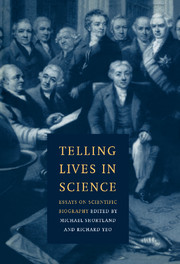Book contents
- Frontmatter
- Contents
- List of contributors
- Preface
- Introduction
- 1 Existential projects and existential choice in science: science biography as an edifying genre
- 2 Life-paths: autobiography, science and the French Revolution
- 3 From science to wisdom: Humphry Davy's life
- 4 Robert Boyle and the dilemma of biography in the age of the Scientific Revolution
- 5 Alphabetical lives: scientific biography in historical dictionaries and encyclopaedias
- 6 The scientist as hero: public images of Michael Faraday
- 7 ‘Tactful organising and executive power’: biographies of Florence Nightingale for girls
- 8 Taking histories, medical lives: Thomas Beddoes and biography
- 9 The scientist as patron and patriotic symbol: the changing reputation of Sir Joseph Banks
- 10 Metabiographical reflections on Charles Darwin
- Index
Introduction
Published online by Cambridge University Press: 28 October 2009
- Frontmatter
- Contents
- List of contributors
- Preface
- Introduction
- 1 Existential projects and existential choice in science: science biography as an edifying genre
- 2 Life-paths: autobiography, science and the French Revolution
- 3 From science to wisdom: Humphry Davy's life
- 4 Robert Boyle and the dilemma of biography in the age of the Scientific Revolution
- 5 Alphabetical lives: scientific biography in historical dictionaries and encyclopaedias
- 6 The scientist as hero: public images of Michael Faraday
- 7 ‘Tactful organising and executive power’: biographies of Florence Nightingale for girls
- 8 Taking histories, medical lives: Thomas Beddoes and biography
- 9 The scientist as patron and patriotic symbol: the changing reputation of Sir Joseph Banks
- 10 Metabiographical reflections on Charles Darwin
- Index
Summary
Biography today occupies an unusual, perhaps even an uncomfortable, place in our culture, being one of the most popular and yet least studied forms of contemporary writing. Readers in their tens of thousands consume biographies avidly and offer publishers a sure market for the life stories of writers, musicians, film stars and sporting heroes. ‘The Age of Biography is Upon Us’ announces a recent article (Bowker 1993), as anyone will know who steps into a bookshop or glances at the year's best-seller lists. A 1994 poll on reading habits in Britain showed biography to be the most popular category of non-fiction book, selected as their favourite by 19 per cent of readers, a number matched by the most popular category of fiction, ‘romance’, and considerably ahead of contemporary fiction, read by just 14 per cent of readers (D.S. 1994; see also Beauchamp 1990 for US data). The market for biography is by no means restricted to the ‘popular’ end of the spectrum: a typical issue of the Times Literary Supplement (21 October 1994) carried a lead review devoted to a biography of William Tyndale, an extended review of a biography of Mrs Dorothy Jordan, and reviews of biographies of Kremlin wives, and Nikolai Bukharin's widow: in its listings, there were more entries under ‘Biography’ than under ‘Fiction’, ‘Polities’, ‘Literature and Criticism’, more than in any other category.
- Type
- Chapter
- Information
- Telling Lives in ScienceEssays on Scientific Biography, pp. 1 - 44Publisher: Cambridge University PressPrint publication year: 1996
- 7
- Cited by



